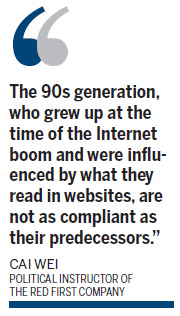Young soldiers rewrite rules
Updated: 2011-11-01 08:04
By An Baijie (China Daily)
|
|||||||||

MIANCHI, Henan - Soldier Li Mingyu's grandma said that the sweetest apple she ever ate was the one Li peeled for her when the family visited him in the military camp.
A year's military training has brought about dramatic changes in Li's personality, said his grandma. Gone are the days when he would act like a spoilt brat. "I still remember, once, before he had joined the army, I had peeled an apple for him, which he threw into the dustbin."
Li, born in a millionaire family in Huaihua, Central China's Hunan province, joined the Red First Company in Jinan Military Area Command in 2009 at the age of 18.
The Red First Company dates back to 1927, when Mao Zedong set up the first company-level Party branch to make sure the army was led by the Communist Party of China.
Cai Wei, the political instructor of the company, said that initially Li used to be one of the typical 1990s-born spoilt brats, who would be occupied with technological gizmos such as MP3, iPod, and PSP (PlayStation Portable), and remained aloof from his not-so-privileged fellows.
Li said he was deeply moved when one night his squad leader prepared a basin of warm water for Li to wash his feet. "I didn't know how to express my gratitude because we were still strangers to each other."
"To my surprise, my squad leader said that my parents deserved to be thanked even more since they had done much more for me for years together, a service I had taken for granted in the past," Li said. "His words enlightened me and I learnt to be thankful from then on."
Cai says he has been noting a rebellious, arrogant streak in the new recruits, particularly since 2008, that being the year when those born in 1990 reached adulthood and were ready to be drafted. More than 90.3 percent of newly recruited soldiers are born in the 90s, according to statistics released earlier this year by the Second Artillery Force, China's strategic missile force.
"The 90s generation, who grew up at the time of the Internet boom and were influenced by what they read in websites, are not as compliant as their predecessors," Cai said. "They argue about everything, from whether it is necessary to fold quilts neatly to human rights issues related to one's privacy."
In the beginning, the rebellious 90s-born were treated with the traditional tough measures. If they were caught sneaking out to cyber bars, they would be held in confinement as punishment, Cai says.
Many young soldiers complained that barring them from visiting cyber cafes was too drastic a measure, as going online was a way of keeping in touch with their girlfriends and parents through cyber chatting tools such as QQ.
The regiment established a cyber bar for the exclusive use of soldiers in 2010. Measures have been taken to avoid leakage of confidential material, such as sealing all USB holes, according to Cai.
The company has complied with a few other demands made by the 90s generation. These include installing pumps to irrigate the company's kitchen garden, which would, previously, have to be watered manually. Soldiers now have their private closets. All these measures have been welcomed, especially by the new recruits, Cai said.
Li Min, commissar of the Red First Company's regiment, said these new measures have been introduced to the whole regiment, and were generally welcomed by all.
Wang Jianwu, a general of Jinan military area command, said that the 90s generation of soldiers have sharp characters, which should be properly dealt with.
"They might be self-oriented sometimes, but they also have lots of merits such as innovative thoughts, familiarity with IT knowledge, and so on, which could be helpful."











